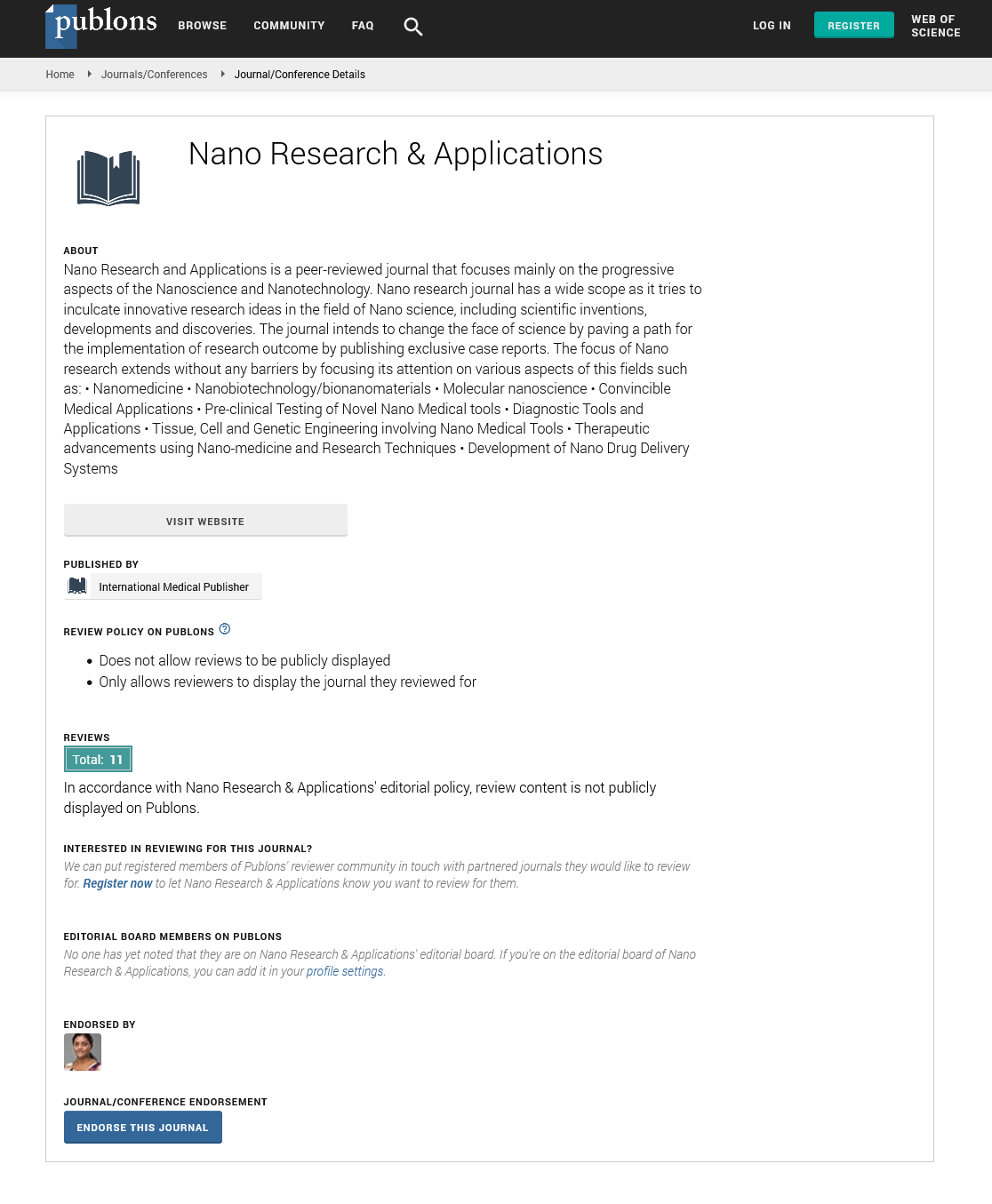ISSN : 2471-9838
Nano Research & Applications
Physicochemical properties and antineoplastic effect of omega-3 PUFA loaded in resveratrol-based solid lipid nanoparticles in human colorectal cancer cells in vitro
Joint Event on 22nd International Conference on Advanced Materials and Simulation & 22nd Edition of International Conference on Nano Engineering & Technology
December 10-12, 2018 Rome, Italy
S Serini, R Cassano, P A Corsetto, A M Rizzo, G Calviello and S Trombino
Universita Cattolica del Sacro Cuore Italy Universita della Calabria, Italy Universita degli Studi di Milano, Italy
ScientificTracks Abstracts: Nano Res Appl
DOI: 10.21767/2471-9838-C7-027
Abstract
A great effort is being expended during the last years in order to find new strategies able to increase the efficacy and to reduce the deleterious side effects of the drugs currently used for the therapy of cancer. It has been widely demonstrated that the antineoplastic therapies with either conventional or single-targeted drugs could take advantage from a combined treatment with omega-3 polyunsaturated fatty acids (omega-3 PUFA). These nutrients, normally present in our diet, especially in marine fish, have been demonstrated to be safe at the concentrations generally used in human trials, and to be able to modulate molecules involved in cancer cell growth, differentiation and survival. It is accepted that inflammation plays a key role in the development of cancer and, among the mechanisms most often invoked to explain the antineoplastic role of omega-3 PUFA, there is their ability to act as potent anti-inflammatory agents. In particular, colorectal cancer (CRC) has been extensively studied among the most common malignancies in the Western world. In the present study, solid lipid nanoparticles (SLN), characterized by a lipid matrix containing resveratrol esterified to stearic acid, have been synthesized and used to encapsulate docosahexaenoic acid (DHA) and α-linolenic acid (LNA). Our aim was to increase the efï¬ciency of the incorporation of these fatty acids into the cells and to prevent their peroxidation and degradation. The resveratrol-based SLN were characterized for their physicalchemical properties, including their antioxidant and for their anti-neoplastic activity. It was observed that the encapsulation of omega-3 PUFA into the SLN enhanced signiï¬cantly their incorporation in human HT-29 CRC cells in vitro, and their growth inhibitory effects in these cancer cells, mainly by reducing cell proliferation. Recent Publications 1. Serini S and Calviello G (2018) Long-chain omega-3 fatty acids and cancer: any cause for concern? Current Opinion in Clinical Nutrition & Metabolic Care 21:83- 89. 2. Serini S, Cassano R, Corsetto P A, Rizzo A M, Calviello G and Trombino S (2018) Omega-3 PUFA loaded in resveratrol-based solid lipid nanoparticles: physicochemical properties and antineoplastic activities in human colorectal cancer cells in vitro. International Journal of Molecular Sciences 19: pii: E586. 3. Serini S, Ottes Vasconcelos R, Fasano E and Calviello G (2016) How plausible is the use of dietary n-3 PUFA in the adjuvant therapy of cancer? Nutrition Research Reviews 29:102-125. 4. Serini S, Ottes Vasconcelos R, Fasano E, Calviello G (2016) Epigenetic regulation of gene expression and M2 macrophage polarization as new potential omega-3 polyunsaturated fatty acid targets in colon inflammation and cancer. Expert Opinion on Therapeutic Targets 20:843-858. 5. Serini S, Zinzi A, Ottes Vasconcelos R, Fasano E, Riillo MG, Celleno L, Trombino S, Cassano R, Calviello G (2016) Role of β-catenin signaling in the anti-invasive effect of the omega-3 fatty acid DHA in human melanoma cells. Journal of Dermatological Science 84:149-159.
Biography
S Serini is currently an Assistant Professor at the Catholic University of Sacred Heart, School of Medicine, Italy. She completed her MSc degree in Biological Sciences in 1999 at Tor Vergata University, Rome. She received a Post-graduate Diploma (Specialty) in Clinical Pathology in 2004, and a PhD degree in Integrated Oncology in 2009 at Catholic University. In addition to research, she teaches General Pathology and Physiopathology in different courses of the School of Medicine, Catholic University of Sacred Heart, Rome. Her professional interests are in the area of neoplastic and inflammatory disease research, with particular attention to the molecular bases of cancer and to the role of nutrition in the prevention/therapy of cancer. She has authored and co-authored over 50 publications in peer-reviewed journals.
E-mail: simona.serini@unicatt.it
Google Scholar citation report
Citations : 387
Nano Research & Applications received 387 citations as per Google Scholar report
Nano Research & Applications peer review process verified at publons
Abstracted/Indexed in
- Google Scholar
- China National Knowledge Infrastructure (CNKI)
- Directory of Research Journal Indexing (DRJI)
- WorldCat
- Publons
- Secret Search Engine Labs
- Euro Pub
Open Access Journals
- Aquaculture & Veterinary Science
- Chemistry & Chemical Sciences
- Clinical Sciences
- Engineering
- General Science
- Genetics & Molecular Biology
- Health Care & Nursing
- Immunology & Microbiology
- Materials Science
- Mathematics & Physics
- Medical Sciences
- Neurology & Psychiatry
- Oncology & Cancer Science
- Pharmaceutical Sciences
